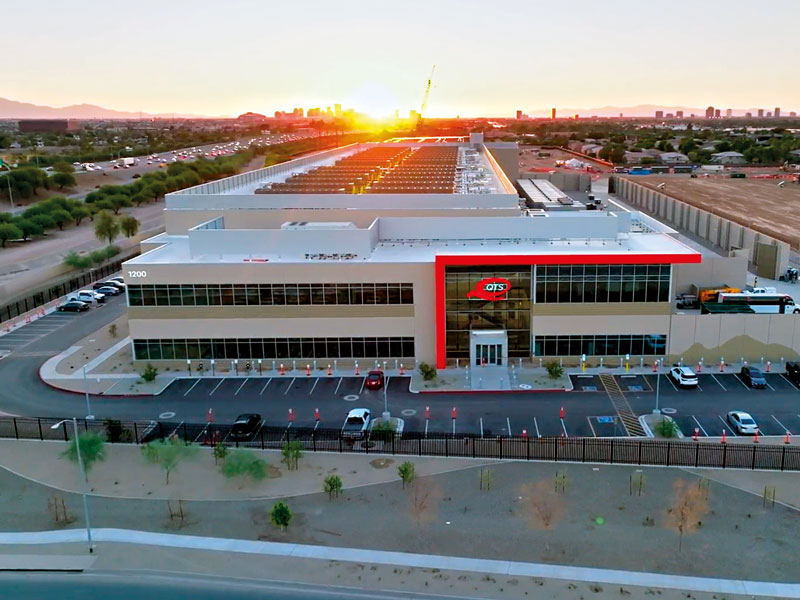
Top 5
As walls rise in the Arizona sun, a group of buildings are quickly coming together that will provide necessary infrastructure for our modern economy to operate. Usually unknown to outsiders, the four walls of the large nondescript buildings enclose some of the most valuable resources on the planet: data. Glendale will soon be home to one of QTS Data Centers’ largest campuses that support mission-critical technology applications for our customers. Thanks to our innovative QTS Freedom standard design, QTS’ data centres will use no water for cooling, saving hundreds of millions of gallons of water per year.
As part of the company’s stewardship of local resources, QTS continues to strive for strong sustainability measures that drive efficiencies and limit environmental impact. Where our locations call home is also home to our employees, customers, and data centre users. We are passionate about environmentally preserving our operational regions and doing our part to enhance those communities.
Globally, QTS has worked diligently to maintain power efficiency standards, replanted hundreds of thousands of trees, and supported the development of new solar projects via long-term power purchase agreements. In addition to our commitment to procure 100 percent of our electricity from carbon-free sources by 2025, QTS has made water conservation a key pillar of our sustainability strategy. Areas like Glendale and Phoenix, situated in the American desert landscape, are rightfully cautious with resources like water. Data centre equipment produces intense heat that requires cooling mechanisms that keep the IT infrastructure load from overheating. This is critical to systems our community relies on, such as emergency doctors accessing hospital records, e-911 centres transmitting life-saving information, or commuters using ride-share apps. To ensure systems like these are uninterrupted, data centres must keep customers’ IT load efficiently cooled. Traditional data centres often use millions of gallons of water each year to cool their systems. But it doesn’t have to be this way.
A water strategy
The QTS Freedom standard design, which was developed to sustainably manage resources while efficiently managing energy, water, and waste, is incorporated into all new QTS builds, including developments underway. Efficiency is core to this standardised building design, allowing QTS to pinpoint power and cooling to specific spaces to increase efficiency. These closed-loop systems do not consume water. Instead they use a low-pressure pumped refrigerant system that can use outside air to remove heat without using water. The system also employs an economisation mode when outdoor temperatures are below the return air temperature to further increase efficiency. In closed-loop systems like these, the system is initially ‘charged’ with water, refrigerant or both. The system will only need more water if maintenance requires a recharge.
In one Georgia-based data centre alone, by eliminating the use of water to cool Freedom data centres, QTS’ water-free cooling system saves more than 248 million gallons of water annually – the equivalent of water used in more than 2,200 US homes per year.
Philanthropy and partnerships
As part of the success-based giving programme, QTS has partnered with World Vision, a world leader in humanitarian efforts, to sponsor programmes that provide clean water to individuals and communities in need across the globe. Since the start of this partnership, QTS has provided over 37,000 individuals clean water through 13 global water points. QTS’ commitment to sustainable practices also strengthens its water-efficiency efforts. By committing to sourcing renewable energy, QTS strengthens its water-reduction strategy as wind and solar energy sources do not utilise water to produce electricity. QTS has signed long-term contracts for solar- and wind-generated energy in multiple states, sourcing and increasing the amount of its power from renewable energy sources.
Supporting communities
When choosing locations for new facilities, QTS engages in a comprehensive due diligence process and risk analysis. Access to renewable energy and water scarcity within an area are two major considerations. Many regions that offer solar- and wind-generated power are water stressed, with water demand exceeding supply. Unlike other data centres that need to pull water resources from these already strained areas to cool their facilities, the QTS Freedom design requires no water for cooling. This can save considerable amounts of water given the scale and magnitude of its facilities. The cooling systems QTS uses in water-free systems are also more energy efficient, using close to half the amount of power that water-based systems need.
These practices are transformative in communities like Glendale. As the campus comes together, water usage on this plot will be reduced by hundreds of millions of gallons versus the prior use. QTS is creating a water-positive scenario to support this water-stressed community. QTS is continuing to innovate and lead best practices in the data centre industry. Ongoing commitment to sustainability is paramount to building a strong relationship with communities while providing critical services for customers across the world.


